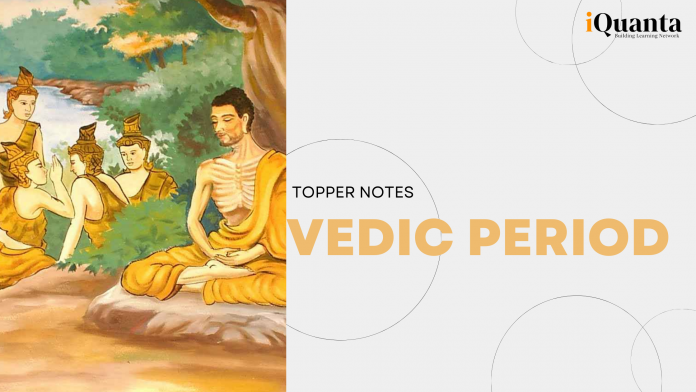Vedic Period (1,500 BC – 6 AD)
Rig Veda was written during the early Rig Vedic period, whereas Sama, Yajur and Atharva Veda was written during the later Vedic period.
| Early Vedic Period | Later Vedic Period |
|---|---|
| Tribe (leader is elected) | State (Janapada) |
| Pastoral/nomadic lifestyle (agriculture not main activity) | Agriculture: settled life |
| No hierarchy (free to undertake any occupation) | Complex varna system developed |
| Nature worship, mantra recitation (w/o intermediaries-Brahmans-free to practice) | Rituals dominated by priestly class |
Sir William Jones: 1st President of Royal Society of Bengal + first person to mention Sanskrit’s similarity to European languages
Max Mueller: Translated Vedas + first to mention that Aryans came from Central Asia
- Aryans did not invade, they came searching for grasslands, came as migrants.
- Aryan was not a race but a linguistic minority.
- Aryans did not push local groups southwards, but merged traditions and created a new composite culture.
Vedic Literature
– Hymns, rituals, sacrifices performed by Brahmans
– Philosophy
– Not composed by any single person
Rig Veda: Hymns for Vedic gods
Sama Veda: Written in musical mode (can be referred to as the first musical book)
Yajur Veda: Introduction of sacrifices
Atharva Veda: non-Aryan traditions, charms & spells, first book on medicine (non-scientific)
– Vedas were known as Shrutis (orally heard, memorized, passed on until put into writing)
Parts of Vedic Literature
Samhita (Hymns)
Brahmana (Rituals & Sacrifices)
Aryanakas (Philosophy)
Upanishad (Philosphy)
Vedanga
– Ceremony-specific rituals for Brahmans
Kalpa (rituals) — For example, Sulva Sutra considered as first book on Geometry
Shiksha (Phonetics-reading mantras with correct pronunciation)
Vyakarana (Grammar)
Jyotisha (Jyotisha)
Chhanda (metrics)
Nirukta (Etymology)
Smriti (Dharma Shastra) — BC 200 – AD 600
– rules of social conduct
– Manusmriti: basis of modern Hindu law, first book translated into English
– Yagya Valkhya Smriti: gives some right to widows
Puranas
– Easy and simple rules of worship.
– Kathas, pilgrimage
– Also deals with paintings and political history
– Bhagvatam Purana
Upanishads
– Last part of Vedas
– Indian philosophy
– Concepts of Karma, Atma, Moksha, Brahma
Early Vedic Period
– Near Sapta Sindhu
– Chalcolithic period
– Tribes: elected leader called Rajan (had to depend on local assemblies-Sabhas)
– No taxation system. However, there was Bali system: voluntary offering by the people to the king
– Ochre-colored pottery: poor level of pottery (indicator of level of society)
– Condition of women better: married post maturity, educated when young, no purdah system, some were composers of Hymns
– There was the mobility in lifestyle
– Indira is a prominent god (Agni and Varuna were also mentioned)
Later Vedic Period
– Tax on agriculture; 1/6th of produce
– Rajan seated on the basis of power
– Painted Grey Ware (stronger pottery)
– Evidence of Rice and Wheat
– Plough was pulled by oxen
– Condition of women deteriorated: marriage age was reduced, no education, kept out of religious affairs
– Varna system developed (concept of Dwija Born)
– Civilization shifted eastwards from Punjab area
– Availability of iron (iron-age in India)
– Period of agricultural surplus: Vaisyas became dominant: felt suffocated within Brahmanical structure: supported growth of Jainism and Buddhism
– Rise of Mahajanapadas (16): some monarchy, some republics: Magadha became prominent Mahajanapada: Others included Kosal, Vatsa, Avanti, Vajji (a republic)
– Vajji: a republic; confederation of 8 tribes (Licchavi as an important tribal group: Mahavira was associated with this tribe)
– Sresthi (local rich merchants) + Sarthva (leader of caravan traders)
– Sreni/Girda: a homogenous group of merchants dealing with one particular commodity (elected their leader)
– Beginning of coins: Punchmarked coins (known as Pana/Karsapana in literature): composition is of copper & silver
– Pottery: Northern Black Polished Ware (of high quality)
– Philosophies like Charvaka/Lokayata & Ajivika developed
Charvaka/Lokayata Philosophy
– Only recorded philosophy of that time to not believe in the concept of aatma or transmigration of soul + known as philosophy or materialism/hedonism
Ajivikas
– Founded by Gosala
– Belief in Niyati (destiny)
– Bindusara was follower of this philosophy

